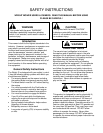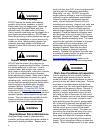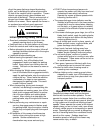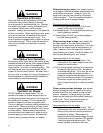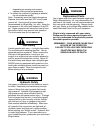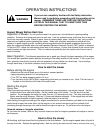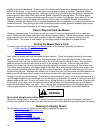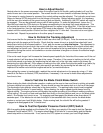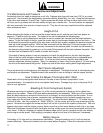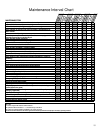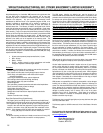11
How to Adjust Neutral
Neutral refers to the mower movement when the engine is set to full throttle, parking brake is off, and the
control levers are in the neutral position. The mower should not move forward or backward during this time.
If the mower is moving forward or rearward, the neutral setting must be adjusted. The hydraulic pump has a
Return-to-Neutral (RTN) device built into the linkage of the pump. Before adjusting neutral, it is necessary
to lift the rear drive wheels off the ground using a jack and stands. Additionally, the OPC switch will need to
be engaged. This can be achieved using a pair of locking pliers. To make the adjustment, loosen the ¼”
Allen bolt and rotate the RTN device on the pump corresponding to the wheel that needs adjustment. This
will require the removal of the wheel needing adjustment for access to the Allen Bolt. If the right wheel turns
in the neutral position, then the right pump RTN needs to be adjusted. The RTN mechanism should be
rotated until the neutral position is found and then retighten the ¼” allen bolt. Use care not to over tighten
the allen bolt. Repeat the procedure on the other pump if necessary.
How to Perform the Tracking Adjustment
First ensure that the tire pressure is equal on both rear drive tires (18-22 psi). Drive the mower on a level
parking lot with the engine at full throttle. Check that the mower drives in a straight line when both hand
controls are held to the full speed position. If not, park the mower and stop the engine. The adjustment is
made by loosening the jam-nuts on the control rods (this may need to be done to one or both control rods)
and adjusting the control rods. Once the jam-nuts are loosened at the top and bottom of the control rod
proceed to turning the control rod clockwise or counter-clockwise to lengthen or shorten the effective length
of the control rod.
If the rod is made longer it will increase the forward speed capability for that side of the mower and if the rod
is made shorter it will slow down that side of the mower. Therefore, if the mower is tracking to the left, either
the left side needs to go faster (by lengthening the left-side rod) or the right side needs to go slower (by
shortening the right-side rod). If the mower is tracking to the right, either the right side needs to go faster (by
lengthening the right-side rod) or the left side needs to go slower (by shortening the left-side rod). It is
important that neither rod should be lengthened too far, as mentioned above.
After getting the mower to track straight, readjust the neutral adjustment on the pump by using a ¼” allen
wrench at the Return-to-Neutral (RTN) mechanism, if necessary. It is normal to make these adjustments
from time to time.
How to Test/Use the Blade Clutch/Brake Switch
Before testing the blade clutch/brake operation, make sure the area is clear and there is nothing vulnerable
to thrown objects from under the mower. No one should be near the mower deck or in its line of discharge.
The discharge chute deflector should be in the down position. The parking brake should now be applied.
Move the engine throttle to ¾ speed setting. When mowing, the engine speed should always be at its
highest setting. The engine governor will regulate the engine according to the different mowing conditions
at that setting. Sit evenly on seat and keep both feet firmly on the foot platform and turn on the blade clutch
switch. Run blades for a minute or so. Try engaging and disengaging the blades a few times about 10
seconds apart. If the blades do not start and stop in a few seconds each time, service the blade brake
system or contact your local Wright dealer. Under mowing load, the clutch’s life will be the greatest if
engaged and disengaged at the ¾ throttle level.
How to Test the Operator Presence Control (OPC) Switch
With the parking brake applied and the blades ON, try lifting your weight off the seat to test the Operator
Presence Control switch (OPC). The engine should begin to kill after a ½ second delay and the blades
should stop within a few seconds. If not, service the OPC system or contact your local Wright dealer.



